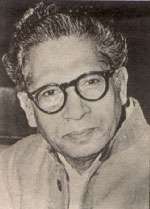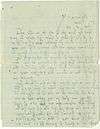Harivansh Rai Bachchan
| Harivansh Rai Srivastava Bachchan | |
|---|---|
 | |
| Native name | हरिवंश राय बच्चन |
| Born |
Harivansh Rai Srivastava 27 November 1907 Allahabad, Agra, British India (now in Uttar Pradesh, India) |
| Died |
18 January 2003 (aged 95) Mumbai, Maharashtra, India |
| Occupation | Poet, writer |
| Language | Awadhi dialect, Hindi |
| Nationality | Indian |
| Ethnicity | Awadhi Indian |
| Alma mater |
Allahabad University Cambridge University |
| Notable awards | Padma Bhushan in 1976 |
| Spouse |
Shyama (1926–1936) Teji Bachchan (1941–2003) |
| Children | Amitabh, Ajitabh |
| Relatives | Bachchan family |
|
| |
| Signature |
 |
Harivansh Rai Srivastava alias Bachchan (27 November 1907 – 18 January 2003) was a noted Indian poet of the Nayi Kavita literary movement (romantic upsurge) of early 20th century Hindi literature. Born in a Srivastava Kayastha family, in the village of Babupatti (Raniganj) in the district of Pratapgarh, he was also a famous poet of the Hindi Kavi Sammelan. He is best known for his early work Madhushala (मधुशाला).[1] He is also the father of the noted Hindi film actor, Amitabh Bachchan. In 1976, he was honoured with the Padma Bhushan for his immense contribution to Hindi literature.[2]

Born in a Kayastha family,[3] in Allahabad while his ancestors belonged to the village of Babupatti in Raniganj tehsil in the district of Pratapgarh, U.P. near Allahabad in the United Provinces (modern Uttar Pradesh) he was the eldest son of Pratap Narayan Shrivastav and Saraswati Devi. He was called bachchan (meaning Kid at home). He received his formal schooling in a municipal school and followed the family tradition of attending Kayastha Paathshaalas (कायस्थ पाठशाला) to learn Urdu as the first step to a career in law. He later studied at the Allahabad University and Banaras Hindu University. In this period, he came under the influence of the independence movement, then under the leadership of Mahatma Gandhi. He honoured with "Proud Past Alumni" in the list of 42 members, from "Allahabad University Alumni Association", NCR, Ghaziabad (Greater Noida) Chapter 2007–2008 registered under society act 1860 with registration no. 407/2000.[4][5][6]
Realizing that this was not the path he wanted to follow, he went back to the university. However, from 1941 to 1952 he taught in the English Department at the Allahabad University and after that he spent the next two years at St Catharine's College, Cambridge, Cambridge University doing his doctoral thesis on W.B. Yeats.[1] It was then, that he used 'Bachchan' as his last name instead of Srivastava. Harivanshrai's thesis got him his PhD at Cambridge. He is the second Indian to get his doctorate in English literature from Cambridge. After returning to India he again took to teaching and also served at All India Radio, Allahabad.[1]
In 1926, at the age of 19, Bachchan married his first wife, Shyama, who was then 14 years old. However she died ten years later in 1936 after a long spell of TB at just 24 years of age. Bachchan again married, Teji Bachchan, in 1941. They had two sons, Amitabh and Ajitabh.
In 1955, Harivanshrai shifted to Delhi to join the External Affairs Ministry as an officer on Special duty and during the period of 10 years that he served he was also associated with the evolution of Hindi as the official language. He also enriched Hindi through his translations of major writings. As a poet he is famous for his poem Madhushala (a bar selling alcoholic drinks). Besides Omar Khayyam's Rubaiyat, he will also be remembered for his Hindi translations of Shakespeare's Macbeth and Othello and also the Bhagvad Gita. However, in Nov 1984 he wrote his last poem 'Ek November 1984' on Indira Gandhi's assassination.
Harivanshrai was nominated to the Indian Rajya Sabha in 1966 and government gave him the Sahitya Akademi award three years later. In 1976 he was honoured with the Padma Bhushan for his immense contribution to Hindi literature. He was also honoured with the Saraswati Samman for his four volume autobiography, Kya Bhooloon Kya Yaad Karoon, Needa Ka Nirman Phir, Basere Se Door and Dashdwar se Sopan Tak.[7] the Sovietland Nehru Award and the Lotus Award of the Afro-Asian writers' conference, for his unique contribution to the world of letters. But if ever asked to introduce himself, he had a simple introduction: Mitti ka tan, masti ka man, kshan-bhar jivan — mera parichay. (A body of clay, a mind full of play, a moment’s life – that is me.).
Bachchan died on 18 January 2003, at the age of 96, as a result of various respiratory ailments.[8] His wife Teji Bachchan died nearly five years later in December 2007, at the age of 93.
Career
Teaching career
From 1941 to 1952 he taught English Literature at Allahabad University and then spent two years at Cambridge University, at St Catharine's College.[1] There he studied with the famous English literature don, Thomas Rice Henn, and received a doctorate in English Literature for his work on the Irish poet W.B. Yeats[1] and Occultism. It was there that he used Bachchan as his last name instead of Srivastava. He was the second Indian to get his doctorate in English literature from Cambridge University.
After returning to India, he taught briefly and then worked as a producer for All India Radio, Mumbai.[1] In 1955, he moved to Delhi to join the Ministry of External Affairs of the Government of India and there he was closely involved with the evolution of Hindi as the official language of India.[1]
Bachchan used to introduce himself as
| “ | Mitti ka tan, masti ka man, kshan-bhar jivan– mera parichay. (मिट्टी का तन, मस्ती का मन, क्षण भर जीवन, मेरा परिचय) (A body of clay, a mind full of play, a second of life – that's me)[1] |
” |
Works used in movies
Bachchan's work has been used in Movies and music multiple times. A few notable examples are -
- "Rang Barse", a famous Holi song from Hindi movie Silsila starring his son Amitabh Bachchan
- Couplets of his work "Agneepath" are used throughout in the movie Agneepath (1990 film) again starring Amitabh Bachchan and later in the remake Agneepath (2012 film)[9]
- Couplets of "Koshish karne waalon ki kabhi.." are used in the movie Maine Gandhi Ko Nahin Mara
- Manna Dey sang the musical version of Madhushala
- 'Koi Gata Main So Jata', a beautiful song from the Movie Alaap sung by K. J. Yesudas starring his son Amitabh Bachchan
List of works
|
|
|
References
- 1 2 3 4 5 6 7 8 Harivanshrai Bachchan, 1907–2003 Obituary, Frontline, (The Hindu), 1–14 February 2003.
- ↑ "Padma Awards" (PDF). Ministry of Home Affairs, Government of India. 2015. Archived from the original (PDF) on 15 November 2014. Retrieved July 21, 2015.
- ↑ https://books.google.com/books?id=OFFWNqHeu6UC&pg=PT107&dq=harivansh+rai+bachchan+kayastha&hl=en&sa=X&ei=hqK6Ut76IML5rAfHx4GQDQ&ved=0CDgQ6AEwAQ#v=onepage&q=harivansh%20rai%20bachchan%20kayastha&f=false
- ↑ "She is Proud Past Alumni Allahabad University"
- ↑ " Internet Archive of Proud Past Alumni"
- ↑ "" Internet Archive of Proud Past Alumni"
- ↑ "Saraswati Samman, 1991: Harivansh Rai 'Bachchan'" (PDF). K.K. Birla Foundation. Retrieved 2014-09-23.
- ↑ "South Asia | Thousands mourn poet Bachchan". BBC News. 19 January 2003. Retrieved 26 February 2013.
- ↑ http://www.imdb.com/name/nm0045394/
- ↑ "In the Afternoon of Time: An Autobiography: Harivansh Rai Bachchan, Rupert Snell, Baccana, Harivansh Rai BacHChhan: 9780670881581: Amazon.com: Books". Amazon.com. 1 April 1998. Retrieved 19 May 2013.
- मधुशाला का मूल पाठ (विकीस्रोत पर)
- हरिवंश राय बच्चन (हिन्दी विकीपीडिया पर)
- मधुशाला (हिन्दी विकीपीडिया पर)
- हरिवंश राय बच्चन (विकीस्रोत पर)
- A Collection
Further reading
- Kaveendra, Anil Pushker. Harivanshrai Bachchan Ki Anuvad Drishti (Hindi) (Hardcover) (2013). Ruby Press & Co., New Delhi. ISBN 978-93-82395-20-1